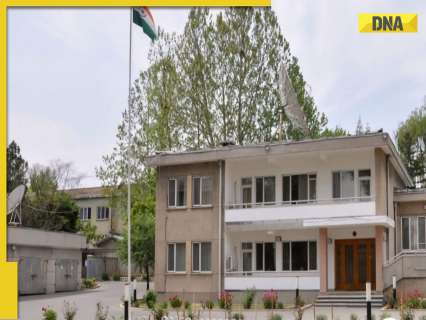
This week, news reports say that India is reopening its embassy in Pyongyang, North Korea. The embassy was closed for over three years because of the pandemic. Now, India is sending diplomats and technical staff back to North Korea to resume regular operations.
India’s decision to reopen its embassy in North Korea reflects a shift in its foreign policy, according to experts. This move is seen as a way to tackle security challenges related to missile technology and to maintain its presence in a region known for its unpredictable political dynamics.
This week, news reports say that India is reopening its embassy in Pyongyang, North Korea. The embassy was closed for over three years because of the pandemic. Now, India is sending diplomats and technical staff back to North Korea to resume regular operations.
Abhishek Sharma, a research assistant at the Observer Research Foundation in New Delhi, stated in an interview with This Week in Asia that India’s decision to reopen its embassy is a strategic step driven by three important factors, as reported by SCMP.
The first concern is about the spread of nuclear, ballistic, and hypersonic missile technologies to Pakistan, which directly affects India’s national security.
The second concern is about Pyongyang’s increasing influence in Northeast Asia and the broader Indo-Pacific region.
The third concern is the potential for successful talks between the US and North Korea, which could have worldwide effects, especially regarding the denuclearization of the Korean Peninsula under the upcoming Trump administration.
The researcher stated that it is logical for Delhi to maintain an active embassy in North Korea.
In July 2021, India closed its embassy in Pyongyang by recalling the Ambassador and all staff. The External Affairs Ministry mentioned Covid-19 as the reason but did not officially announce the closure of the embassy.
A senior research associate at the Manohar Parrikar Institute for Defence Studies and Analyses stated that India has never cut off its diplomatic relations with North Korea, according to SCMP.
Initially, there was some sympathy for the situation. However, India grew upset due to its involvement in a network that was supplying weapons to countries like Pakistan and China. A senior researcher noted that India has consistently supported the Korean people, who are unfortunately split between North and South Korea.
The opening of the embassy does not imply that India’s strong ties with Japan and South Korea will be impacted.
India will continue to be an active participant in the Quad while also working with other nations in the region to ensure stability and prosperity in the Indo-Pacific. The Quad is a strategic security group that includes Australia, India, Japan, and the United States.
The embassy is reopening at a time when Donald Trump is set to return to the White House. During his earlier term, Trump reached out to North Korean leader Kim Jong-un in an effort to strengthen relations between the two nations.
Dr. Jagannath Panda, head of the Stockholm Center for South Asian and Indo-Pacific Affairs at the Institute for Security and Development Policy, shared that Trump might focus on maintaining dialogue with North Korea. He could aim to negotiate either a gradual easing of some sanctions or even the full removal of all sanctions, according to a report by SCMP.
“In this situation, many countries may reconsider their current stance on North Korea,” Panda explained to This Week in Asia. “India should take the opportunity to rebuild its ties with North Korea. Reopening the embassy is a well-timed and strategic decision.”
Panda stated that with South Korea facing political uncertainty, North Korea might adopt a more open and active approach to diplomacy to reshape its stance on various regional and global matters.
Panda suggested that this is a good opportunity for India to reconnect with North Korea through diplomacy and address key issues in Northeast Asia.
India is among the few nations that have kept relations with North Korea, even amid its nuclear threats. In 1973, India established diplomatic ties with both North Korea and South Korea, maintaining a neutral and balanced stance.
In 2017, India halted economic activities with North Korea due to nuclear sanctions but continued to maintain open communication.
In 2018, India’s junior foreign minister at the time, V.K. Singh, visited Pyongyang. During the visit, he emphasized the dangers of nuclear proliferation, especially highlighting India’s concerns about its links to neighboring regions, according to a statement from the foreign ministry.
The statement said that North Korea, officially called the Democratic People’s Republic of Korea (DPRK), assured India that as a friendly nation, it would not take any actions that could threaten India’s security.
In recent years, North Korea has strengthened its ties with Russia, China, and Iran.
Harsh Pant, a professor of international relations at King’s College London, told SCMP that North Korea is aiming to become a global player by sending troops to Ukraine and strengthening its partnerships with Russia. It is also expanding its involvement in the global missile and nuclear proliferation network.
India is becoming a significant Indo-Pacific power with interests in Southeast Asia and the Korean Peninsula, according to Pant. This is why India is strengthening ties with South Korea, and having a presence in North Korea also holds strategic importance.
(The author of this article is a Defence, Aerospace & Political Analyst based in Bengaluru. He is also Director of ADD Engineering Components, India, Pvt. Ltd, a subsidiary of ADD Engineering GmbH, Germany. You can reach him at: girishlinganna@gmail.com)
(Disclaimer: The views expressed above are the author’s own and do not reflect those of DNA)
